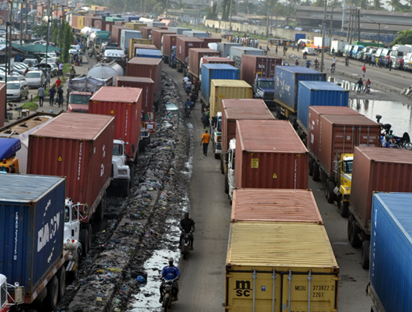
Truck drivers and other motorists plying the Apapa-Wharf Road have heaved a sigh of relief as the Nigerian Ports Authority (NPA) officially opened the Lilypond Truck Transit Park as part of efforts to stem the gridlock in Apapa.
When SHIPS & PORTS visited the park on Monday, empty and export containers were seen exiting the facility to the port. It was gathered that no fewer than 1,000 trucks have so far transited to the port through the park since it was opened on Friday.
It was also observed that all the containerised trucks parked along the Ijora Bridge have been cleared off the highway thus allowing some smooth ride into Apapa.
Speaking to SHIPS & PORTS, a member of the truckers union, Adebayo Toafik, lauded NPA for the truck transit park initiative, which he said has brought succor to truck drivers who go through harrowing experience daily to enter the port.
He said the NPA call-up –system, which is being implemented alongside the truck transit park, has eased the traffic gridlock as truck drivers can now access the port only when called upon. He added that none of his members have also complained of extortion from the NPA security personnel saddled with the responsibility of managing the facility.
“The system being introduced by NPA is a welcome development and we are happy with this plan to ease traffic. You cannot just put your truck on the road without being called. Any truck that you see going out now are the ones that are ready to do business and you cannot see them on the road; they are going straight to the port, discharge their goods, load another one and go out and if they did not see anyone to load, they will come out and go and park at their garage.
“The traffic has been eased. The trucks can only come when there is need and we know when it is needed for them to come and those not to come because we are the ones arranging it within ourselves. We just align with NPA as the regulator of the system in order to get a free flow of traffic. Even the drivers are happy because once you get to the transit park, it is certain that you will get into the port to do your business.
“Any trucks you see parking on the road means they don’t have garage. If we are able to maintain the first come, first serve method, I see no reason why we should not be able to sustain the park more so that we don’t have issue of extortion here,” he said.
A motorist, Abdul Folajimi urged NPA to open up more transit parks so that priority could also be given to export containers.
He said, “With this initiative, the drivers will now have rest of mind. It is no longer a situation where they will spend days on the road and they will not be able to sleep. Right here, they can go out and come back so long they have their call- up.”
An NPA official who does not want his name in print told SHIPS & PORTS that the implementation of the call-up system is one of the control measures put in place by the management to proffer solution to the traffic gridlock.
“This is a transit park so they (trucks) don’t stay here. They come here, if possible within 30 minutes that is our target, and we send them out. If you don’t have call up, you will not be admitted here. So when you are coming in here, we check the call-up, then we’ll admit you here and when it is your turn, we send you out. The call-up is intact and that is the control measure we use.
“We sent the trucks in batches to the road. We control them because we know what the terminal operators wants, we know the ships that are waiting at berth and we also know how to sequence them so that the road will be free and there is no congestion. Most importantly, there is no extortion from anywhere here. NPA under this dispensation has zero tolerance for corruption,” he said.
The second transit park located at the Tin Can Island port second gate also billed for commissioning last week was yet to be opened for operation when SHIPS & PORT visited the facility on Monday.
